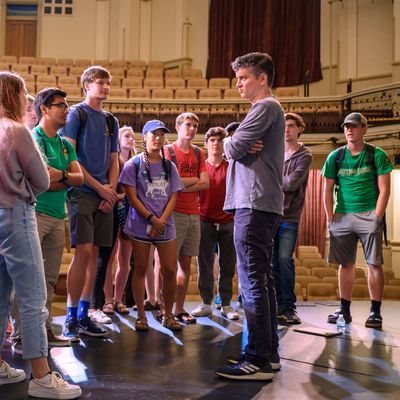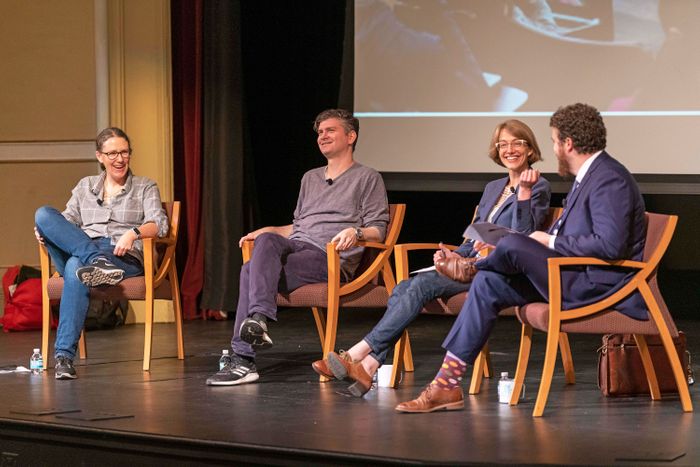
On a Monday afternoon at the University of Notre Dame this fall semester, 17 college students sat around a long table with a very special guest. They had convened in a sleek meeting space known as the “Founders Room,” not their usual classroom, and there was a catered lunch on warming trays along the wall. The students dressed more nicely than they otherwise might — no one was wearing sweatpants — and in this gussied-up setting with such an important newcomer, there was a distinct, jittery vibe that had already caused one student to knock over a glass of water.
To lighten the mood, they answered a typical icebreaker question: Which character from The Office, Brooklyn Nine-Nine, Parks and Recreation, or The Good Place did they most identify with?
“Leslie Knope.”
“Phyllis from The Office.”
“Rosa.”
“A paradoxical hybrid of April and Tom.”
It’s only after Mary Crawford, a junior majoring in film, television, and theater, answered, “I would definitely say Chidi. Unequivocally,” that the class’ guest of honor finally spoke up.
“Then you’re not like Chidi,” quipped Mike Schur, eliciting laughter from the students. Chidi, The Good Place character portrayed by William Jackson Harper, has never made a decision unequivocally in his life. Schur would know, since he created the character, along with all the other ones being discussed.
This is “The Good Class,” a new seminar entirely focused on the sitcom he created, The Good Place. But what exactly was Schur doing on a college campus in northern Indiana? Why fly to the middle of the country so he could have lunch with a bunch of college kids? It all started with a letter. Notre Dame philosophy professor Meghan Sullivan teaches a freshman philosophy course called “God and the Good Life,” and last November, she set her sights on booking Schur as a guest speaker.
“The central question we pose to the 300-some students we teach each semester in [“God and the Good Life”] is: What does it take for you to have a good life?” Sullivan wrote in her letter to Schur. “Each of our class meetings also poses an answer — You should be maximizing utility in the world! You should pursue the life of contemplation! And so on. We discuss the relevant philosophy and then debate a current event that turns on that theory.” Her students, she explained, culminate the course with a philosophical defense of how they choose to live their lives. “We would love to bring you to Notre Dame to talk with our students about the how and why behind making such an ambitious and awesome sitcom around the question of the good life,” she wrote.
After nodding to Immanuel Kant and nihilism, Sullivan wrapped up the letter with a joke about Jeremy Bearimy (“My research area is philosophy of time. We are about to start putting our Ph.D. students through their oral exams. I am strongly tempted to include a question explaining Jeremy Bearimy time.”) and gave it to someone, who gave it to someone, who gave it to Notre Dame alumnus Regis Philbin, who happens to be Schur’s father-in-law. The letter finally reached Schur last Thanksgiving.
“Regis came up to me and went, I got this, I don’t know what to do with it, here! and threw it in my face,” Schur says. “And I read it and thought, This sounds awesome. The class sounds like the exact academic equivalent of what the show is, which is a sampling platter of a lot of big ideas and concepts.”
Schur got back to Sullivan less than two weeks after she first handed off her letter. Once he agreed to come to her class, she started to think even bigger. She got together with film, TV, and theater professors Ricky Herbst and Christine Becker, and the three began planning an interdisciplinary course entirely devoted to The Good Place. And once they announced the one-credit class, officially called “The Good Class — The Philosophy and Production Behind The Good Place,” demand for enrollment was so high that the professors had to create an application form and upped the class size from 12 to 17 students. (Though the course was limited to philosophy and film, television, and theater majors, they got plenty of emails from other students pleading their case.) Becker says they wanted everything about the class to feel true to the show, so they asked themselves, “How would The Good Place do it?” To that end, the application only had two questions:
1. Why do you deserve to be admitted into the Good Class? Provide specific reasons accompanied by the approximate points you believe you have earned for each of these achievements.
2. We recently discovered that no one has passed the Good Class in centuries, so please provide your suggestions for how the course should be fairly graded going forward. Answers should be no longer than 400 words each, and creativity will be rewarded.
“We wanted it to be a filter for the people who were hardcore,” Sullivan explains. “We’re all doing this for free. This doesn’t count for any of our teaching credits. So if I’m going to give up a bunch of Fridays to talk about this show with you, you’ve got to be nerding out on this hard.”
The students’ nerd credentials didn’t disappoint. Some answered the question “Why do you deserve to be in the Good Class?” by ascribing point totals to their good and bad deeds. (“Purchasing a reusable stainless-steel straw to be sustainable: +743.33” was offset by “showing off my straw to any and everybody: -176.54.”) One student submitted an imagined transcript of her conversation with Michael upon entrance to the Good Place. Others gave examples of their good qualities: “Honesty: When a ‘novelty ID company’ sent a letter to my home address in response to my customer service complaint (i.e. they didn’t send me my goddamn fake ID), my parents were quite upset. BUT I did not lie to them.”
It’s not hard to see why professors took on extra work and students fought to get into the class — the syllabus was full of thought-provoking lessons that seemed more like fun than schoolwork. The semester kicked off exploring “What’s so special about The Good Place?” through mini sessions on the television industry, humor theory, and virtue ethics. Each week focused on a new theme, with Sullivan taking the philosophy and Herbst and Becker splitting the TV topics; one class was devoted to contemporary virtue ethics and how well the show nails them, while another debated the critical reaction to whether Chidi and Eleanor deserve to be labeled soulmates. UCLA professor and The Good Place advisor Pamela Hieronymi guest-lectured for the class on “Virtue Ethics for Script Writing,” and NBC VP of production Michael Swanson Skyped in to talk about the TV industry.
But of course, there is still homework to be done in the Good Class. Along with readings, there are required episode viewings: One week, season three’s “Jeremy Bearimy” and “Pandemonium” were paired with an academic article about how Comic-Con marketing labels “good fans” as those whose devotion can be monetized, rather than those whose fandom is the most pure. In other words, it plays off the question humming at the heart of The Good Place: What makes someone good?
The class was planned before Schur announced that season four would be The Good Place’s last, but when the professors eventually found out, they were thrilled. Exploring The Good Place academically during its final season offered them the rare opportunity to engage with the show’s ending in real time.
“The potential to talk in class about the decision to end the show, how TV shows end, how you put finality on philosophical interrogations, the pedagogical opportunities of this being the final season?” Becker says. “As a total nerd, that’s the most thrilling thing to me.”
As the day’s two-hour session — sandwiched between a morning visit to Sullivan’s “God and the Good Life” class and a public talk titled “Can TV Make Us Better People?” in the evening — came to a close, the students were eager to get their final questions in. When someone asked how Schur thinks streaming will affect the industry long-term, he pointed out that while television can create a dialogue on a national scale, people rarely watch things together or at the same pace in the Peak TV era. “When I have never seen The Americans and someone else has never seen ER and someone else has never seen The Crown, we’re all flailing around trying to find a common language to talk about our culture,” Schur says. “The idea that we all have something to talk about is disappearing, and I think that’s bad.”
The Good Class, at least, provides one place where people convene every week to talk about what they just saw.
“[This class is playing with] the idea of what it means to watch and debate television like this together. To use television as a vehicle. It’s hard to talk about ethical issues these days. It’s hard to have a common language that’s not hyper politicized or hyper reductive,” Sullivan says. “We need cultural questions like this to do some of the 2,400-year-old work on our souls.”


